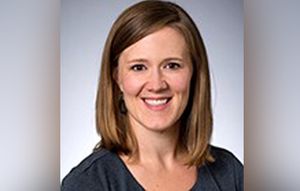
The goal of Dr. Katie Phelps Walsh when she arrived on the Catawba College campus in 2001 was to play softball and become a high school history teacher.
The Catawba community changed her. She became so impressed by the faculty members and their impact on students that she decided she wanted to become one of them. After graduation in 2005, she spent a few years working in the Catawba Admissions Office and then went to the University of Pittsburgh where she earned her Ph.D. in Early Modern European History.
As a graduate student, she taught college courses, both as a teaching assistant and as an instructor of record. She worked with Pitt's Teaching Center and eventually became a Teaching Center Fellow. That position introduced her to the field of educational development – a field that primarily focuses on teaching and learning in higher education.
That, she decided, was where she belonged. With Ph.D. in hand, she moved to educational development at Carnegie Mellon University's Eberly Center for Teaching Excellence and Educational Innovation. Today, she is a Senior Teaching Consultant at Carnegie Mellon.
Her work involves managing center programs, conducting research on teaching and learning, and supporting faculty and graduate students in developing their courses and using evidence-based teaching strategies to maximize student learning.
And just to take her back to her Catawba roots, she also teaches courses in the History Department. "I still love history, but I was more interested in the teaching aspect of higher education than conducting historical research," she says.
She came to Catawba because of the softball team. "Truthfully, I went to Catawba because I was recruited for the team," she says. "Once I got there, I found so much more. Catawba showed me the powerful impact that college faculty members can have on their students, and it gave me an appreciation and understanding of many different academic disciplines – not just the one I was majoring in. Both of these are essential to my current role at the CMU Teaching Center because my job is to help faculty from every academic discipline create impactful learning experiences in their classrooms. In doing so, I not only leverage research from the learning sciences and educational psychology, but I also channel the passion for teaching that so many of my Catawba faculty members exhibited."
Katie says that her Catawba courses taught her not only "disciplinary knowledge of history, sociology, etc., but they also taught me how to think outside my discipline, how to consider different perspectives, and how to look for connections across different fields. This type of thinking is much closer to the type of 'real world' knowledge and skills that are essential to success in any career."
As an undergrad, Catawba's smaller size was also appealing. "I was moving six hours away from home, and I wanted the chance to get to know people," she says.
Catawba offered her a sense of community that was inspiring. "I had friends from many different parts of campus – my teammates, fellow history majors, fellow Honors students. It felt like we were all part of the same community."
She says this "sense of community" extended beyond the student body and faculty. "Some of the greatest memories from Catawba involve connections I made with alumni from the 1940s," she says. "I was initially introduced to them through a history project, but my relationships with them extended far beyond our initial connection. The Catawba that they spoke of sounded very similar to the one I knew, despite the almost 60-year difference. We were all part of one big Catawba community, one that lives on today in the lives of its current students."
Katie says that it is 100 percent OK for an incoming student to not know what career to pursue. "The liberal arts education at Catawba will help you start to figure that out. Embrace every opportunity!" she recommends.
"I went to Catawba to be able to teach high school history and to play softball. While I loved my history courses and my time on the ballfield, I found so much more to enjoy. I found the field of sociology, in part because I was required to take it as part of a liberal arts education. I ended up earning a sociology minor, and I went on to earn a graduate certificate in Women and Gender Studies. I found the College Honors Program, where I had the opportunity to conduct primary research, something that would prove essential to my success in graduate school.
"My career path represents just one of the many ways that Catawba has impacted my life."
